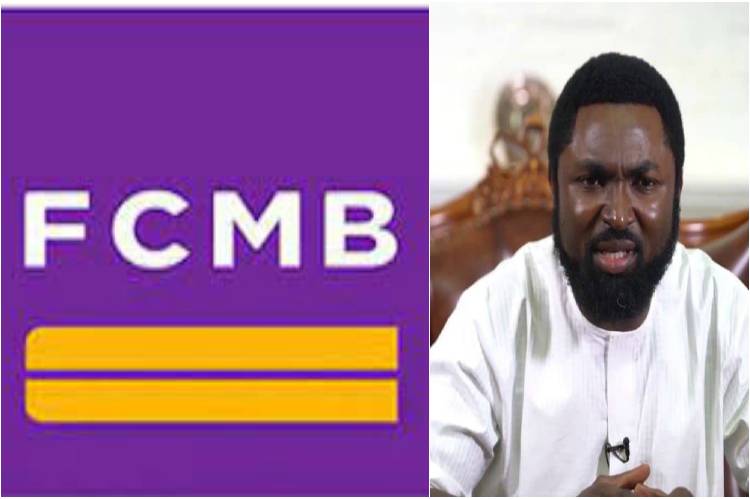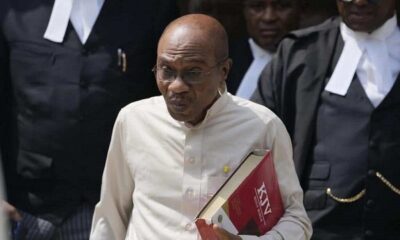Nigeria News
Court orders FCMB to pay Prophet Omale N540 million in damages over defamation

A Federal High Court sitting in the Capital Territory (FCT), Abuja has awarded a N540 million judgment against the First City Monument Bank (FCMB) in the N5 billion defamation suit filed by Prophet Emmanuel Omale, founder of the Divine Hand of God Prophetic Ministry, Abuja.
The presiding Judge, Justice Yusuf Halilu, gave the order on Tuesday October 4th, 2022.
Omale had filed the suit over the alleged false information that the bank passed to the Nigerian Financial Intelligence Unit (NFIU) on a “suspicious credit inflow”.
Omale accused the bank of negligently breaching the fiduciary duty of care in its banker-customer relationship with his client.
Adam Nuru, former managing director of First City Monument Bank (FCMB), had told the Presidential Committee on Audit of Recovered Assets (PCARA) that the bank made an error of posting N573 million into the church’s account.
The committee had accused Ibrahim Magu, former Chairman of the Economic and Financial Crimes Commission (EFCC), of using Omale to launder funds abroad.
However, the bank later clarified that there was a system error that affected Omale’s account but no transfer was made.
In a letter to Omale, the bank expressed regrets and published a public apology in three national newspapers as demanded by Omale’s lawyer.
Speaking through Gody Uche, SAN, Omale told the court that the false alarm and summons caused his name to be dragged in the mud in the media which caused him untold hardship, trauma and great financial losses.
He said although the bank owned up in its letter published in three national newspapers, the damage had already been done.
In his judgment, Halilu awarded N200 million in aggravated damages, N140,500 million in special damages, and N200 million in general damages.
“The conduct of the Defendant in this case, clearly from the evidence that has been made out, is certainly careless and negligent; it is certainly not careless and negligent but unprofessional”, the judge held.
The judge also cleared Omale.
“Sometime in the year 2016, the Defendant negligently and falsely in its computer system generated weekly automated report to the Nigerian Financial Intelligence Unit (NFIU) alerted the Nigerian Financial Intelligence Unit (NFIU) of a “suspicious” credit inflow of N573, 228, 040. 41 (Five Hundred and Seventy-Three Million Naira, Two Hundred and Twenty-Eight Thousand, Forty Naira and 41 kobo) into the 1st Claimant’s Corporate Current Account No: 1486743019 in line with the Money 125 Act and the tension Act; the Economic and Financial Crimes Act and the Terrorism Prevention Act, which mandates the Defendant to report any suspicious financial transaction of its customers,” part of the court documents revealed to newsmen.
“Pursuant to the said false automated report by the Defendant to the Nigerian Financial Intelligence Unit (NFIU), concerning the 1st Claimant, the Claimants were placed under criminal/financial investigation by the Nigerian Financial Intelligence Unit (NFIU) and other security agencies, since the year 2016, and suffered untold hardships by investigation by the Presidential Investigation Committee which sat at the Presidential Villa, Abuja and later the good name of the 2 Claimant was publicly dragged to the mud in the media in consequence of the said false report of the Defendant.
“The Claimants offered the Defendant an opportunity to amicably settle this matter out of court, as the Defendant had publicly admitted its error in generating a false weekly automated report to the Nigerian Financial Intelligence Unit (NFIU) which offer the Defendant out of impunity ignored, hence this suit.
“The kernel of the Claimants’ suit is anchored firmly on the negligence of the Defendant in generating a false weekly automated report to the Nigerian Financial Intelligence Unit (NFIU), which false report has occasioned untold hardships, trauma and great financial losses on the Claimants.
“We submit most respectfully that the Defendant by its various admissions and apologies have admitted their error or negligence in the automated report (Exhibit DH) it sent to the (Nigerian Financial Intelligence Unit) NFIU about the Claimant’s account. We refer your Lordship to the Defendant’s Letter dated September 11, 2020 (Exhibit DA) and the 3 (three) newspaper publications of Guardian, Dally Trust and Business Day Newspapers of 13 September 2020 admitted in evidence as Exhibits “DB”, “DC” and “DD” respectively. In these documentary pieces of evidence, the Defendant owned up to its error/mistake/negligence, which resultantly occasioned damages against the Claimants. The DW2 also confirmed this fact under cross-examination thus:
“In furtherance of the above pleading, we submit that the nature of the negligence of the Defendant is in the genre of res ipsa loquitor, the matter speaks for itself. Even from the facts of the case it is clear that the negligence arose from the act of the Defendant. In MANAGEMENT ENTERPRISES LTD vs. OTUSANYA (1987) 2 NWLR (PT.55) 179 @ 191, Oputa, JSC stated the essence of the maxim of res ipsa loquitor to be that an event, which in the ordinary course of things was more likely than not to be caused by negligence was by itself evidence of negligence depending of course on the absence of explanation.”
(Credit: Sahara Reporters)

























